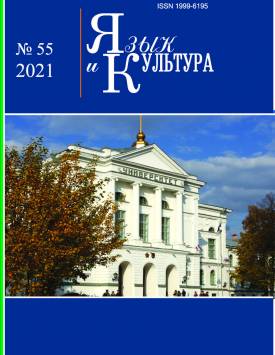Features of learning a foreign language of Yakut-Russian bilinguals
Yakutia is the largest subject of the Russian Federation in terms of territory, its population is notable for its heterogeneity and multinational composition. The indigenous people of the region include the Yakuts, as well as representatives of the indigenous minorities of the north. The overwhelming majority of students are national-Russian bilinguals, whose native language is Yakut. The language policy of Yakutia is characterized by the natural Yakut-Russian bilingualism of its native inhabitants. Education plays a leading role in the development and preservation of multilingualism. Knowledge of Russian, native and foreign languages is a stimulus and a means of forming students' linguistic thinking. On the territory of the northern region there are active processes of the formation of a competitive market, industrial development of the Arctic and sub-Arctic territories, which today cannot be imagined without the participation of foreign partners and investors. Due to the favorable geopolitical position of the republic, both European and Eastern foreign languages are being studied. There are fears that the active industrial development of Yakutia, including its Arctic Zone, by Russian and foreign companies may lead to the loss of the identity of the indigenous peoples of the northern region and the loss of their national identity. The relevance of the study is confirmed by the need to preserve and develop human capital within implementation of large-scale national projects. The aim of the study is to improve the quality of teaching a foreign language to the national-Russian bilinguals of Yakutia in the constantly changing conditions of the development of Russian society. Research objectives: study and analyze the array of theoretical domestic and foreign research on the issues of interest to us; identify groups of features inherent in students from the indigenous peoples of Yakutia in the study of a foreign language; fill the content of foreign language education with a national-regional component; carry out the selection of forms, methods, means, techniques of teaching a foreign language based on the characteristics of northerners. In the terminological field of linguodidactics, the concept of “ethnomethodics” has been introduced, which means the mastery of the language and culture of the country of the foreign language being studied by taking into account and displaying in the content of foreign language education the specific features of the contingent of students representing the indigenous population of one or another subject of the Russian Federation, their mentality, national culture and traditions. The positive experience can be multiplied and disseminated in other national subjects of the Russian Federation. As a part of the research, a number of features of the Yakut-Russian bilinguals were modified to the existing ones: phonetic (difficulties in pronouncing hissing sounds, reduction of sounds, brevity and length of vowel sounds, presence of diphthongs); perceptual (the process of perception is carried out through images; perception of a new phenomenon with an already existing example from reality, hierarchical processing of information); emotional and behavioral (inertia, emotional closeness, preference for teamwork, passive behavioral model). The formulated features affect the process of mastering a foreign language and the ways of interaction between subjects of the university educational process, and, therefore, should be taken into account when designing a regional foreign language education and filling its content. The presence of a national-regional component in the content of the main professional educational programs of non-linguistic specialties within the framework of courses related to the study of a foreign language is explained by the desire of teachers to introduce students to future professional activities through the academic discipline being studied. In Yakutia a large number of deposits of natural resources and minerals are being developed and mined, which is attractive to foreign investors: large-scale measures are being taken on the territory of the region for the strategic development of the Far East and Russia as a whole. In these conditions, knowledge of foreign languages, including eastern ones, is becoming more and more popular. Flora and fauna of the northern republic is unique and unparalleled in the world, which attracts a significant number of research scientists and tourists. The extreme climatic conditions of Yakutia are widely known beyond its borders, and adaptation of the human body to such conditions is also of great scientific and practical interest abroad. Thus, the region dictates and determines the demand of society for graduates of a non-linguistic profile with knowledge of a foreign language. The main emphasis in teaching a foreign language for students of non-linguistic specialties is placed on professionally oriented texts, containing a national-regional component, and a situation whose task is to model the future professional activity of a specialist with knowledge of a foreign language: a builder, an economist, a mining engineer, a doctor, a biologist, etc. Conventionally, modelled situations typical for a non-linguistic university located in Yakutia are divided into two large groups: demonstrating the real capabilities of the northern region for foreign partners; considering the cultural heritage and traditions of the republic. Prospects for the work consist in the development of scientific and theoretical foundations for the formation of foreign language competence from the standpoint of modern approaches to education in the context of the shift in the vector of international contacts in Yakutia to the east and acceleration of relations with the countries of the Asia-Pacific region.
Keywords
foreign language, specifics of learning, national-Russian bilinguals, indigenous peoples of Yakutia, students of non-linguistic specialitiesAuthors
| Name | Organization | |
| Bezukladnikov K.E. | Perm State Humanitarian Pedagogical University | konstantin.bezukladnikov@gmail.com |
| Parnikova G.M. | North-Eastern Federal University | allerigor@yandex.ru |
References

Features of learning a foreign language of Yakut-Russian bilinguals | Yazyk i Kultura – Language and Culture. 2021. № 55. DOI: 10.17223/19996195/55/11
